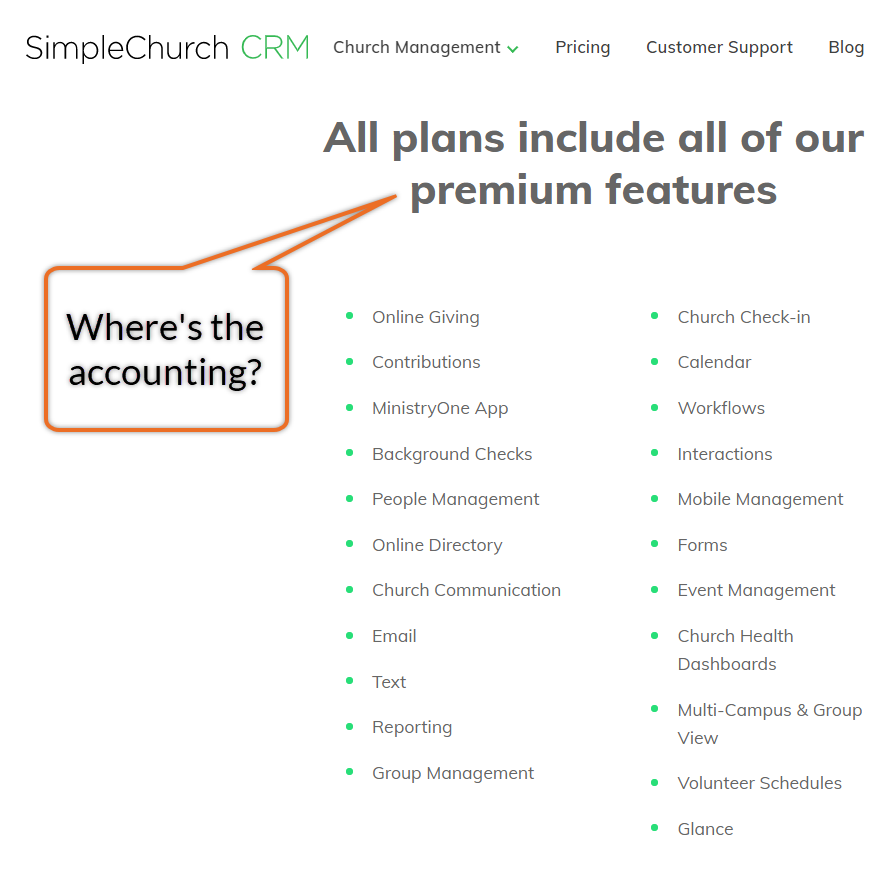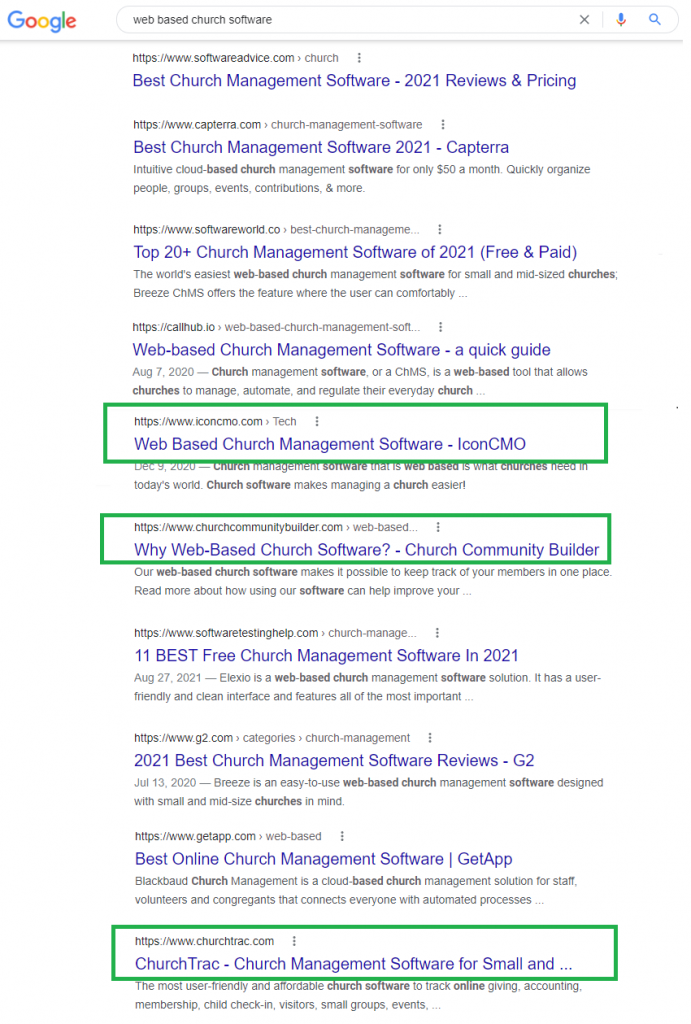This post was last updated on November 22nd, 2021 at 11:49 am.
Software Review Sites Introduction
As church committees review various software packages, many times they start with church software review sites to cut down the work. It’s an attempt to get to the end goal of selecting software using the least amount of effort and time. They use these websites to find a shorter list to work from. The question is, does this strategy work? Is it good or bad to go about it this way? We’re going to go over what to look for when evaluating church software and using church software review sites.
Spoiler alert: It depends on how you use it.
How To Use Church Software Review Websites The Right Way.
If you are unfamiliar with the names and brands in the church software market, it would be best to use the church software review sites to get familiar with the players. Gather their names, websites, and contact information into one list instead of sifting through Google results. Outside of this process, there isn’t much more that should be used from those sites, initially.
Using The Software Review Websites The Wrong Way.
Let’s discuss some of the reasons these lists are the wrong way to compare software. The reasons are vast and sometimes very complicated, but we will try to break them down.
Reason #1 — The Review Site Is An Aggregate Website.
This one is hard to figure out from the outside perspective. Let’s first discuss what an aggregate website means. What these websites do is collect reviews from the supposed leading review websites like Capterra, G2Crowd, and GetApp. An example of this is the website SoftwareWorld.co. Below is an explanation from their website.

Why are aggregate websites bad? Simply put, bad data in, is bad data out. They are taking information from primary websites like Capterra and assuming that data is valid. However, oftentimes it’s not correct, as we will show later. (Reason #3) Then they create their top software list automatically, based on that questionable data, and present it to you as a review website. They don’t review the data to ensure its accuracy.
What this type of website does is called website scraping. The short definition is, they pull data off of other review websites and present themselves to you as a credible review website. These sites didn’t put any work into writing the reviews, ensuring the accuracy of the reviews or even the contact information. Sometimes these sites are a subdivision of the main sites like Capterra, G2Crowd, and GetApp.
Why would the main review sites allow website scraping? Simply put, many times the main website and the scrapping website are owned by the same company. In most cases, this would be seen as a conflict of interest. However, in this case, having multiple website names helps one company boost their websites toward the top of Google results for all searches.
Website scraping affects Google search rankings — you lose out.
How does website scraping affect Google search results? If you were to do a search for ‘web based church software’, the review sites take up 7 of the 10 available search results on the first page. The user is only seeing a small selection of software companies. In this case, they are seeing only three legitimate church software companies as the rest are review websites.
A reasonable person would expect to see a majority of review websites if the search terms were ‘church software reviews’, rather than simply ‘web based church software’. There’s a big difference between these two queries from the user’s perspective, but Google panders to the review websites in both instances. At the time of this writing, if you did a search for ‘church software reviews’ the review websites dominate 9 out of 10 spots.
Let’s look below at the screen capture for the Google search of ‘web based church software’. Notice there are only 3 out of 10 (marked in green) results for vendors that actually sell software! It’s a huge disservice to the end-user when this happens and why we mentioned it.
Reason #2 — Same Company Owns Multiple Review Websites.
Why is it bad to see similar lists from the same company on multiple websites? It gives the user a false sense in regard to recommendations. To the user, they think they are seeing multiple sources giving them the same software recommendations. This is a very persuasive marketing tactic called ‘the power of repetition’. Let’s explain it using an analogy.
You are back in college and you have a 100-page scientific term paper due with references. You go about your research gathering scientific evidence from what you believe are multiple sources. For example, the scientific evidence that you gathered are research papers written by different doctors in their respective fields.
You turn your term paper in for a grade and get a big fat ‘F’. But why? The professor points out that the references used, are all working for one company or government entity. When conducting the research you failed by not ensuring the references were independent of each other.
Reason #3 — Church Review Websites Are Inaccurate.
These lists are inaccurate and outdated when reviewing a vendor’s software features sets. The companies on the review list aren’t independently audited for what they say they have. And to make matters worse, the lists are very biased towards companies that pay them advertising dollars to list their company toward the top of the lists. The review sites are nothing more than an advertising mechanism, instead of an honest, audited, and unbiased church software review.
Real life example where Capterra is incorrect
Let’s use a real-life example to show one of the inaccuracies. Below is a screen capture from Capterra using a filter called ‘built-in accounting’ outlined in red. This list should only display products that actually have a built-in accounting package. It should not show those, such as SimpleChurchCRM, that don’t have built-in accounting packages or accounting from a third-party software. After all ‘built-in’ means that the module is an integral part of the software — not from another platform.

One visit to SimpleChurch CRM website will show you that they do not have an accounting package in their feature set. There’s no mention of it as a product. Do they use someone else’s accounting package such as Quickbooks? It’s not clear. What is clear though, is that Capterra is not showing accurate information per the SimpleChurchCRM website. See below for a list of features.

Now, this is not to say SimpleChurchCRM is doing something wrong or misleading anyone. Maybe their clients don’t need accounting or it isn’t one of their business goals to provide this kind of software — and that’s perfectly fine. After all, Icon Systems doesn’t offer every feature in our software either. Adding features and modules are business decisions and none of them are right or wrong, per se.
However, what this illustration shows, is that the review website — Capterra, is disseminating incorrect information for SimpleChurchCRM’s features. The end result confuses churches and their software selection committees when making church software recommendations. There are many instances of inaccurate information on church software review sites, which is why a fuller more logical approach is required.
Reason #4 — The Pay To Play Scheme
When visiting a church review website, most users will not see how the vendor list is ordered. The only thing that is apparent, is they aren’t in alphabetic order. Sometimes you can find different sort order options for the vendor lists. However, the typical default sort order is that sponsored companies come first. What does sponsored mean, exactly?
“Sponsored” means that the church software vendor paid the review website money to place their name toward the top of the vendor list before everyone else. Very much the same way as athletes have sponsors that pay them money to play and in exchange, these athletes display the company’s name for their fans to see. This is the ‘Pay to Play’ scheme and the worldwide web is fraught with this, so you’ll want to look closely.
Are pay to play schemes truly unbiased?
No, they are not.
But shouldn’t review sites give unbiased reviews and not a listing based on who pays more money? Yes, you would assume so. But it doesn’t work that way. Here’s a screen capture of Capterra’s listing for church software and the default order is ‘sponsored’.

Instead of using the word sponsored, a more honest way of conveying the meaning of sponsorship is to use ‘Paid Sponsors’. Or disclosing at the top of the review list in big bold letters —
The following list is ordered based on which company paid us the most to put their name first.
Joking aside, most people would see this paid sponsorship sorting methodology as a conflict of interest. How can you have a review website that ranks companies, supposedly by some internal criteria, but then change the ranking order simply because certain companies paid a fee to them? In other words, you can have a nonpaying sponsored company that aces the review website’s criteria and should be listed first, but instead, they are listed last because they didn’t pay a sponsorship fee. Hardly seems equitable.
Discussion of other sort order issues
What about the two sort orders — ‘Highest Rated’ and ‘Most Reviewed’? The apparent issue here is you may skip over or not even see certain companies. Why not?
Maybe these companies didn’t want to waste their resources gathering reviews or getting ratings from current clients. Their product can be the best on the market for the organization’s needs. However, the church software selection committee doesn’t see them in the list because they are toward the bottom for the ‘Most Reviewed’ sort order.
Why wouldn’t they have a lot of reviews? One reason could be that they are a newer company and have less than 100 reviews whereas the majority of the older companies have 500+ reviews. Does that make them less of a fit than other companies if they can do everything you need? Not in the slightest.
What’s A Better Process?
The short answer comes from Thomas Edison — there’s no substitute for hard work. The longer answer is that the software selection committee must spend a fair amount of time focused on selecting church software the right way. What works, is rolling up your sleeves and going down a complete list of software vendors, and either qualifying or disqualifying them based on the criteria set by the selection committee.
The first step shouldn’t be going to Google and searching for vendors or reviews. The first step needs to be identifying and establishing the requirements of the software. This involves understanding the internal processes needed for the organization and are specific to that organization. In other words, you can’t take a canned list from another organization. Software selection- simply put- is not a fast nor an easy process. When shortcuts are used, the organization will pay the price — eventually.
One area where a review website can help is giving you a list of software vendors that are at least in that particular business sector. This helps when exploring various software options. However, as we mentioned before, don’t just look at the top couple companies listed on these ‘review’ websites. Why? More than likely, they paid to be listed first. It is necessary to review the entire list to find all of the companies that should be contacted in an unbiased review.
A Few Final Thoughts
It does take some research to find out how each of these review websites may be connected with each other. As the old saying goes — ‘follow the money’. When you follow the money, it will typically show you who has the most to gain when persuading users in a certain direction.
It would be less suspicious if the review sites were at least owned by different entities but that isn’t the case here and why one must be conscientious. Software selection committees must follow the money to understand the entire software landscape.
For example, the Gartner Group owns three of the reviews sites (Capterra, Software Advice, and GetApp) that show up in Google search results. These sites, as stated earlier, subtly direct software users to the software companies that pay them to list their company first via sponsorship.
One final thought is, should the user get different results from Google when they search ‘church software’ vs. ‘church software reviews’? We think so, as those using either one of these search queries have an end goal that’s vastly different than the other. Google has some work to do in its algorithm to sort this out. Software users should understand this when reviewing search results from any search engine.

Leave a Reply